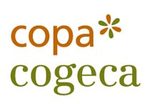|
|
| 27 jun 2024 |
09:43 |

|
Critical role of agri-cooperatives for cereals and seeds
Yesterday, Cogeca held the first of its Business Fora for 2024, on the theme “How can agri-cooperatives secure robustness in the cereals and seeds sectors?”.
|
|
Discussions addressed key trade issues related to cereals and seeds, transport, logistics and storage to facilitate trade flows across Europe. The event, held in Brussels, brought together industry leaders, and agri-cooperative experts to highlight the key role of agri-cooperatives must play in ensuring the success of these sectors.
Opening the event, Christian Høegh-Andersen, Cogeca Vice-President and Coordinator of the Business Forum stated that, “Agri-cooperatives support European farming in key aspects such as ensuring fair trade practices, transport and logistics, supplying farmers with key commodities, creating jobs and further stimulating economic activity, without forgetting the positive environmental and social externalities our enterprises create.”
The Forum featured a compelling keynote speech by Vito Martielli, Senior Analyst for Grains and Oilseeds at Rabobank, which provided critical perspectives on the grains and seeds markets. His insights set the tone for the day's discussions, emphasising the importance of innovation and strategic planning in the cereals and oilseeds sectors. This was followed by a presentation by Alexander Doring, Secretary-General at FEFAC, focusing on the importance of better cooperation models in securing robustness for strategic commodities.
The event highlighted how cooperatives across Europe employ diverse risk management tools to support their members and operations. In Romania, farmers can deduct up to 70% of insurance costs, and efforts are underway to redirect direct payments into a risk management system. Spain ensures price stability by timing the sale of raw materials to livestock farmers. In Denmark, local market analysis informs recommendations for cooperatives, while in Germany, there's a call for market-ready products and sensible climate risk advice due to varying conditions like water scarcity. Generational renewal is crucial, with initiatives in Denmark and Spain focusing on youth outreach and educational support. Despite challenges such as committee size and volunteer work demand, cooperatives play a strategic role in decarbonising farming and enhancing the resilience of the grains and seeds sectors. Cooperation across the food chain remains vital for sustainable growth and stability.
Lennart Nilsson, Cogeca President closed the event, stating, “By showcasing best practices to address current feed challenges, we have shared vital information and expertise that will help us overcome the obstacles we face. Overall, this event has highlighted the agri-cooperative model as a key driver in creating opportunities for fairer, more competitive and more secure cereals and seeds sectors.”

|
|
|
|
